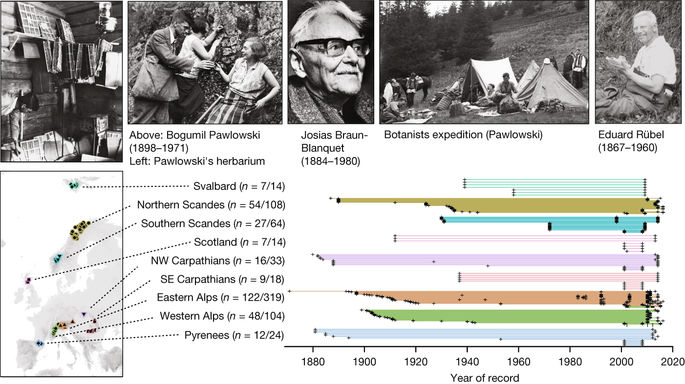Our official English website, www.x-mol.net, welcomes your feedback! (Note: you will need to create a separate account there.)
Accelerated increase in plant species richness on mountain summits is linked to warming
Nature ( IF 64.8 ) Pub Date : 2018-04-01 , DOI: 10.1038/s41586-018-0005-6 Manuel J. Steinbauer , John-Arvid Grytnes , Gerald Jurasinski , Aino Kulonen , Jonathan Lenoir , Harald Pauli , Christian Rixen , Manuela Winkler , Manfred Bardy-Durchhalter , Elena Barni , Anne D. Bjorkman , Frank T. Breiner , Sarah Burg , Patryk Czortek , Melissa A. Dawes , Anna Delimat , Stefan Dullinger , Brigitta Erschbamer , Vivian A. Felde , Olatz Fernández-Arberas , Kjetil F. Fossheim , Daniel Gómez-García , Damien Georges , Erlend T. Grindrud , Sylvia Haider , Siri V. Haugum , Hanne Henriksen , María J. Herreros , Bogdan Jaroszewicz , Francesca Jaroszynska , Robert Kanka , Jutta Kapfer , Kari Klanderud , Ingolf Kühn , Andrea Lamprecht , Magali Matteodo , Umberto Morra di Cella , Signe Normand , Arvid Odland , Siri L. Olsen , Sara Palacio , Martina Petey , Veronika Piscová , Blazena Sedlakova , Klaus Steinbauer , Veronika Stöckli , Jens-Christian Svenning , Guido Teppa , Jean-Paul Theurillat , Pascal Vittoz , Sarah J. Woodin , Niklaus E. Zimmermann , Sonja Wipf
Nature ( IF 64.8 ) Pub Date : 2018-04-01 , DOI: 10.1038/s41586-018-0005-6 Manuel J. Steinbauer , John-Arvid Grytnes , Gerald Jurasinski , Aino Kulonen , Jonathan Lenoir , Harald Pauli , Christian Rixen , Manuela Winkler , Manfred Bardy-Durchhalter , Elena Barni , Anne D. Bjorkman , Frank T. Breiner , Sarah Burg , Patryk Czortek , Melissa A. Dawes , Anna Delimat , Stefan Dullinger , Brigitta Erschbamer , Vivian A. Felde , Olatz Fernández-Arberas , Kjetil F. Fossheim , Daniel Gómez-García , Damien Georges , Erlend T. Grindrud , Sylvia Haider , Siri V. Haugum , Hanne Henriksen , María J. Herreros , Bogdan Jaroszewicz , Francesca Jaroszynska , Robert Kanka , Jutta Kapfer , Kari Klanderud , Ingolf Kühn , Andrea Lamprecht , Magali Matteodo , Umberto Morra di Cella , Signe Normand , Arvid Odland , Siri L. Olsen , Sara Palacio , Martina Petey , Veronika Piscová , Blazena Sedlakova , Klaus Steinbauer , Veronika Stöckli , Jens-Christian Svenning , Guido Teppa , Jean-Paul Theurillat , Pascal Vittoz , Sarah J. Woodin , Niklaus E. Zimmermann , Sonja Wipf

|
Globally accelerating trends in societal development and human environmental impacts since the mid-twentieth century1–7 are known as the Great Acceleration and have been discussed as a key indicator of the onset of the Anthropocene epoch6. While reports on ecological responses (for example, changes in species range or local extinctions) to the Great Acceleration are multiplying8, 9, it is unknown whether such biotic responses are undergoing a similar acceleration over time. This knowledge gap stems from the limited availability of time series data on biodiversity changes across large temporal and geographical extents. Here we use a dataset of repeated plant surveys from 302 mountain summits across Europe, spanning 145 years of observation, to assess the temporal trajectory of mountain biodiversity changes as a globally coherent imprint of the Anthropocene. We find a continent-wide acceleration in the rate of increase in plant species richness, with five times as much species enrichment between 2007 and 2016 as fifty years ago, between 1957 and 1966. This acceleration is strikingly synchronized with accelerated global warming and is not linked to alternative global change drivers. The accelerating increases in species richness on mountain summits across this broad spatial extent demonstrate that acceleration in climate-induced biotic change is occurring even in remote places on Earth, with potentially far-ranging consequences not only for biodiversity, but also for ecosystem functioning and services.Analysis of changes in plant species richness on mountain summits over the past 145 years suggests that increased climatic warming has led to an acceleration in species richness increase.
中文翻译:

山峰植物物种丰富度的加速增加与变暖有关
自 20 世纪中叶 1-7 以来,全球社会发展和人类环境影响的加速趋势被称为大加速,并被认为是人类世时代开始的关键指标 6。虽然关于大加速的生态反应(例如,物种范围的变化或局部灭绝)的报告正在成倍增加 8, 9,但尚不清楚此类生物反应是否随着时间的推移经历了类似的加速。这种知识差距源于关于大时间和地理范围内生物多样性变化的时间序列数据的有限可用性。在这里,我们使用来自欧洲 302 个山峰的重复植物调查数据集,跨越 145 年的观察,评估山区生物多样性变化的时间轨迹,作为人类世的全球连贯印记。我们发现整个大陆的植物物种丰富度增加速度加快,2007 年至 2016 年间物种丰富度是五十年前的 1957 年至 1966 年间的五倍。这种加速与加速的全球变暖惊人地同步,而非与其他全球变化驱动因素相关联。在如此广阔的空间范围内,山峰上物种丰富度的加速增加表明,即使在地球上的偏远地区,气候引起的生物变化也在加速,不仅对生物多样性,而且对生态系统功能和服务都有潜在的深远影响.
更新日期:2018-04-01
中文翻译:

山峰植物物种丰富度的加速增加与变暖有关
自 20 世纪中叶 1-7 以来,全球社会发展和人类环境影响的加速趋势被称为大加速,并被认为是人类世时代开始的关键指标 6。虽然关于大加速的生态反应(例如,物种范围的变化或局部灭绝)的报告正在成倍增加 8, 9,但尚不清楚此类生物反应是否随着时间的推移经历了类似的加速。这种知识差距源于关于大时间和地理范围内生物多样性变化的时间序列数据的有限可用性。在这里,我们使用来自欧洲 302 个山峰的重复植物调查数据集,跨越 145 年的观察,评估山区生物多样性变化的时间轨迹,作为人类世的全球连贯印记。我们发现整个大陆的植物物种丰富度增加速度加快,2007 年至 2016 年间物种丰富度是五十年前的 1957 年至 1966 年间的五倍。这种加速与加速的全球变暖惊人地同步,而非与其他全球变化驱动因素相关联。在如此广阔的空间范围内,山峰上物种丰富度的加速增加表明,即使在地球上的偏远地区,气候引起的生物变化也在加速,不仅对生物多样性,而且对生态系统功能和服务都有潜在的深远影响.

























 京公网安备 11010802027423号
京公网安备 11010802027423号